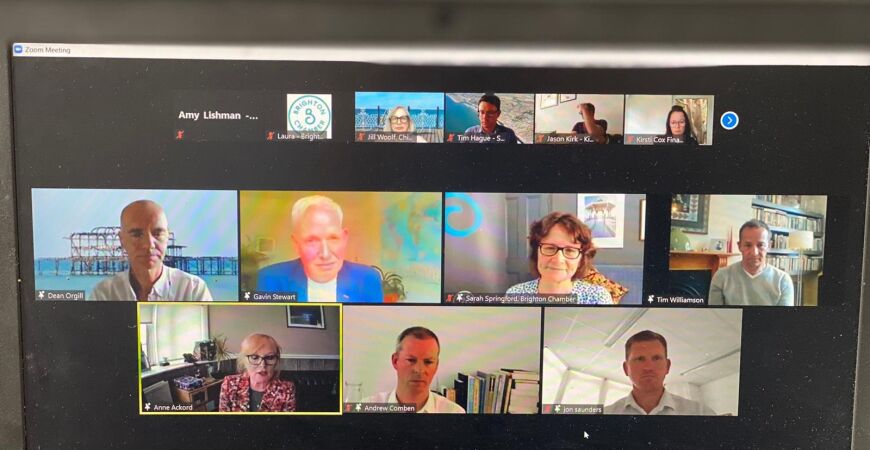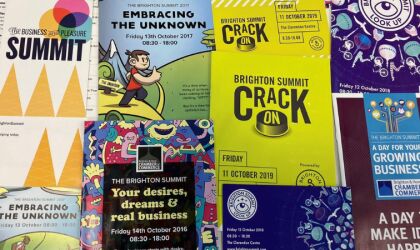

Fri 11 / 06 / 21
What's next for Brighton? Let's exploit the glamour of our city
Flo Powell of Midnight Communications writes after Brighton Chamber and BHEP's latest City Event: What's next for Brighton's economy?
By Flo Powell of Midnight Communications
On Thursday 10 June, Brighton Chamber members were treated to another City Event in collaboration with the Brighton and Hove Economic Partnership (BHEP) to consider the question: ‘What’s next for Brighton’s economy?’
Chaired by Dean Orgill, Chairman of Mayo Wynne Baxter and Chair of BHEP, the panel of experts discussed how we can pull together to create a brighter future for our city with a focus on improving the welcome to visitors, to boost our economy with repeat visitors and higher spend.
Ultimately, it was agreed that Brighton, as we all know, is a fantastically eclectic city with a unique offer. Over the next year and beyond it is going to be vital for Brighton to compete effectively with its neighbours to gain market share in the visitor economy. However, with an ever-reducing local authority budget, how can we collaborate as a city to make this happen?
For Anne Ackord, CEO at The Brighton Pier Group PLC, there are three areas that need a laser focus for improvement: cleanliness, welcome and a joined-up transport plan.
This last bank holiday weekend, the pier welcomed 200,000 visitors and sold many thousands of sticks of rock. People still want to come to this great city and enjoy themselves. However, with cleanliness being such a big issue, the worry is that they won’t come back again. Anne’s call is for the city to be regularly cleaned so that the bins, graffiti and chewing gum are tackled.
The city’s welcome is often discussed and is something I also feel strongly about. In the 50s and 60s, Brighton had people dressed up and walking along the seafront, helping and welcoming visitors. In Anne’s words, we need to ‘exploit the glamour’ of Brighton and improve our welcome.
Anne also called for a joined-up plan to allow visitors to travel here by car - this is especially important this summer as there will be no trains from Victoria in June. The city needs to allow for both cars and cyclists and improve our walking routes for visitors.
Fresh from finishing another successful Brighton Festival, Andrew Comben, CEO at Brighton Dome & Festival, spoke passionately about Brighton’s cultural offer.
Andrew has been working on a Cultural Recovery Plan for Brighton, supported by the Brighton & Hove City Council and the Arts Council.
Andrew has also been working in collaboration with BHEP to explore ways that arts and culture can support the city’s retail sectors, particularly in the shoulder months.
The plan also includes building a programme of business support and Andrew called for local training providers to get in touch to help. A Creative Communities Network is also being set up, to establish local infrastructure to help communities across the city to organise cultural events.
Andrew also hinted at a bumper Brighton Festival in 2022 to celebrate (hopefully) post-pandemic and the return of the Corn Exchange.
For Jon Saunders, former General Manager of Pryzm, now living in Cardiff, the opportunities lie in adaption and diversity for Brighton’s night-time industry.
Jon commented: “the biggest thing people need to do is adapt and change”. Without the late-night economy, Brighton lacks a big part of its offer. For nightclub owners, they’ve got to consider how to use their space differently to adapt to the challenges during the pandemic.

Gavin Stewart, CEO at Brighton BID, has been working to support local businesses since 2000 and was delighted that his members all agreed to continue to invest when asked in March 2020 during the pandemic. It proves what I’ve said in countless Chamber blogs – this city is all about collaboration and the fact that the BID members chose to invest in this city during their toughest year in decades, to pull together for the greater good, shows what a great city we really have.
This investment means the BID can continue with our wonderful Christmas lights, summer decoration and its city centre ambassador scheme – although these aren’t the sort of ambassadors Anne was talking about – these folks are focused on crime reduction.
The great news, and in answer to Anne’s earlier call for city cleaning, the BID members voted to invest more to tackle this issue. With around 11.5m visitors a year, predominantly into our city square mile, keeping that area clean is “the devils own job” so in July and August, the BID will be jet washing to get rid of the graffiti and chewing gum and improve the welcome.
In terms of retail vacancies, although Brighton is below the national average (14%), we have a 9.25% vacancy rate across the city, with 8.76% in the BID area. The BID is therefore working on a project to inject life into those empty spaces. For the first time ever, BID members voted to put in extra resource for events and culture in the city. This could include wayfinding – thinking creatively about how to get visitors to move around the city - guided tours, commissioned artworks and investing in arts and music.
Tim Williamson, owner of Responsible Travel, has been in business for 20 years and, like all travel business in the city and across the world, has had a bumpy year to say the least. In 2020 they traded at 10% of normal revenues.
Like all travel and night-time economy businesses, they’ve relied heavily on government support including furlough, grants and loans. Of course, the wonderful Chamber team were thanked for helping to flag opportunities in such a difficult time.
The company also survived by sadly shedding some staff and moving out of its home on Bond Street into a hybrid situation of home working and co-working at the Projects. Tim’s staff didn’t want the traditional office model anymore and many were able to enjoy a better work/life balance with hybrid working – some even (sadly for Brighton) moved away to Bristol, Scotland and even Amsterdam.
Luckily, they were able to assign their office lease to another business who came down to Brighton from London – a trend that’s increasing with Brighton tipped to become a regional ‘hub’ for bigger companies.
Tim’s challenge now is to keep the company culture alive and he’s actively seeking exciting and different locations in and around the city for his team to meet up – on the beach, in the woods, on the downs! Ideas on a postcard to Tim please.
In terms of the future of the company, Tim was optimistic and hopeful – inbound travellers from USA have been increasing with fully vaccinated Americans keen to travel - enquiries are now at 2019 levels. However, 2022 will still be a recovery year for the industry and sadly Tim predicts more travel company closures.
Brighton’s co-working spaces all, anecdotally, seem very busy. We now have Platf9m, Plus X, Circus Street, The Projects, The Werks, Freedom Works in place with Edward Street Quarter coming next year. This is clearly a popular trend that the pandemic has accelerated, and Brighton would do well to increase availability of co-working to take advantage.
We also heard from Cllr Tom Druit who mentioned, from a BHCC perspective, that cleanliness is something they have been struggling with and there’s now a renewed effort to tackle it. They’ve been working on plans and learning from other cities including Richmond and Chichester. There’s £80k in the budget this year to conduct a pilot graffiti scheme in the city centre – specifically the area from the station to the sea front with a joined-up approach to include publicly and privately owned buildings. Tom is keen to work with the BID, Chamber and Tourism Alliance to coordinate a rapid response approach – removing graffiti within 24 hours of it appearing to put off the offenders.
The discussion then turned to a particularly contentious subject – a tourism tax for Brighton? Tim quoted the example of Calvia, Mallorca, which includes Magaluf and Palma Nova, which implemented tourism taxes on bed nights to invest in beautifying and cleaning the area. It’s been going for a few years, and they are starting to see a slightly higher average spend per visitor. It’s a tricky one, and not something likely to be welcomed by Brighton businesses that have been through such a tough time to then have to charge more. It could also be a PR disaster if handled incorrectly. However, it could also be the only way we can raise enough funds to do what needs to be done long-term.
The final question to the panellists was ‘what’s the one thing every business could do to make our ‘next’ as a city as positive as possible? For Jon, it’s all about collaboration, for Anne it’s thinking outside the box. Tim wants us all to look after the space outside our homes and offices but longer term, the focus has to be on CO2 emissions reduction and nature preservation. Gavin reminded us that we’re all city ambassadors so let’s make everyone feel welcome in our city. Andrew wants us all to join in, collaborate and stay positive!
There you have it folks, when the chips are down we’ve got to pull together to make our city the best it can be for our businesses, residents and visitors. I’m truly heartened by all the great programmes underway from the council, the BID, the Tourism Alliance and our wonderful Chamber. We can do this Brighton!
With thanks to our event partner, the Brighton and Hove Economic Partnership.
And thanks to Flo Powell, of Midnight Communications.
Flo Powell is Joint MD of Midnight Communications. Midnight works with businesses, professional service firms and brands alike, applying their commercial expertise to crack consumer briefs and approaching B2B campaigns with creative flair. Find out more about Midnight Communications here.
If you want to contribute to the Chamber blog, contact us on hannah@brightonchamber.co.uk



